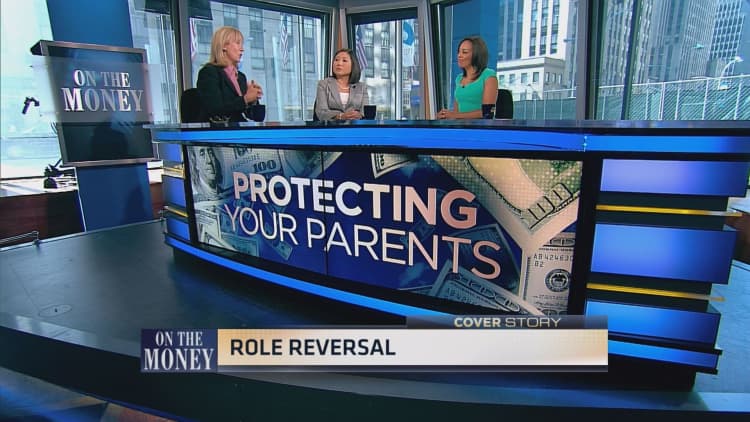Today's different generations are getting cozier when it comes to sharing living space.
But before you sign on to the growing trend of living in a multi-generational household, financial advisors say, you should give money matters as much scrutiny as you would a household chore chart.
"The key to making these household structures work is to make sure no one rides for free," said certified financial planner Hank Mulvihill, principal of Mulvihill Asset Management. "And the more that the reality of all things financial is discussed, the healthier the relationships in the home will be."
According to a 2014 study by the Pew Research Center, 57 million Americans — 18 percent of the U.S. population — lived in multi-generational households in 2012, double the number in 1980. Pew defines such households as those with at least two adults (at least 25 years old) from different generations, or grandparents and grandkids (no parent).
Younger adults — those ages 25 to 34 — have driven much of the trend's growth since 1980 and markedly since 2010. By 2012, 23.6 percent of them lived in multi-generational households, up from 18.7 percent in 2007 and 11 percent in 1980.
Using a broader definition of young adults, data released last month by Pew shows that, as of 2014, 32.1 percent of those ages 18 through 34 were living with parents.
The reasons for the growth in "multi-gen" households are myriad, ranging from economic hardship brought on by the Great Recession of 2007 to 2009 to growing immigrant populations in which living with extended family is a cultural norm.
If it's about to become your standard, too, the best place to start is around the kitchen table, advisors say.
"When you sit people down and explain the logic of who pays for what, unless you've got complete slackers, they'll agree it makes sense," Mulvihill said.
If you take care of others at the expense of yourself, it's going to create problems down the road. Make sure you are on track with your own retirement ... needs and then look outward to help those around you.Ed Vargofounder of Burning River Advisory Group
The common scenario that many advisors see is an adult child — whose baggage might include a spouse or kids — returning to Mom and Dad's home. The potential for endless mooching, say advisors, is huge.
"Kids will take whatever their parents give them," said Ed Vargo, CFP and founder of Burning River Advisory Group. "I don't care if they are 15 or 35; if you provide it, they will take it.
"Set up guidelines before they move in," Vargo added. "You tell them exactly what they are responsible for — whether it's rent or an amount for utilities or groceries or something else — and then put it in writing so no one can say, 'I didn't know.'"
One house expense that can be overlooked in advance is major home repairs. Mulvihill of Mulvihill Asset Management has clients whose written agreement with their adult kids — drawn up after friction built from no clear plan being in place — included a provision that the parents would pay 50 percent of a home-repair cost and each child would chip in 25 percent.
Some multi-gen families come together by moving into another home altogether. In fact, U.S. homebuilders are responding to the trend by marketing floor plans for homes that provide defined, separate living spaces for different generations.

Data from John Burns Real Estate Consulting suggests homebuilders will continue targeting this market. According to the firm's 2016 Consumer Insights survey of more than 20,000 new-home shoppers, 44 percent want to accommodate their aging parents in their next home and 42 percent plan to include an adult child.
If you do go this route, advisors caution to be wary of sharing the home's ownership beyond one family unit.
For starters, having multiple family units on a deed can wreck estate planning. "There is so much power between spouses to transfer titles at death" — free of taxes, said Mulvihill. "Don't give that up."
Additionally, having multiple families holding a joint mortgage has potential tax implications. In simple terms, the person or people who have the legal obligation to pay interest on the mortgage and pay the property taxes are the people entitled to those deductions. That can get sticky if household incomes and mortgage shares are disparate or reliance on those deductions differs.
As for combining households in a way that involves aging or elderly parents, advisors say it's especially important to familiarize yourself with their financial picture. Sometimes, because older generations tend to be more private about their money, this can be challenging.
"They need to know that the more you know about their financial picture, the better a decision-maker you can be" if they become incapacitated, said Vargo of Burning River Advisory.
"Appeal to their sensibility and logic and explain that you are trying to help, and the more you know about what's available to them, the better you can do that," Vargo said.
He also advised keeping in mind that if you provide significant care to an elderly parent, it may qualify you for a tax deduction if you can consider the parent a dependent.
Vargo also pointed out that because elderly parents typically want to feel like they are contributing to the household, you should have some sense of how much they can reasonably contribute without putting themselves in a financial pinch down the road.
"They typically don't want to feel like they're mooching off their children," he said.
Advisors also say contributions in lieu of money, such as providing care for a child, can be just as valuable to the household as cash would be.
Most important, say advisors, opening your door to family must not end up putting your own financial goals at risk.
"If you take care of others at the expense of yourself, it's going to create problems down the road," Vargo said. "Make sure you are on track with your own retirement [savings] needs and then look outward to help those around you."
— By Sarah O'Brien, special to CNBC.com




